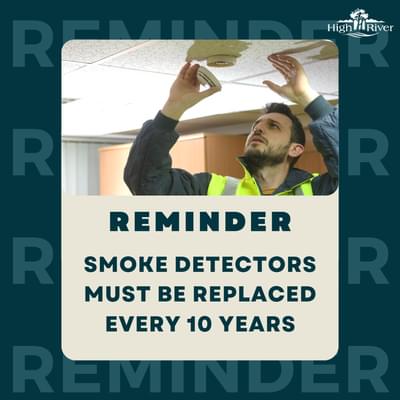
Smoke Alarms & Carbon Monoxide Detectors
Read on to learn about smoke alarms and carbon monoxide detector safety tips.

Smoke Alarms
- Install smoke alarms in every bedroom. They should also be outside each sleeping area and on every level of the home. Install alarms in the basement.
- Large homes may need extra smoke alarms.
- It is best to use interconnected smoke alarms. When one smoke alarm sounds, they all sound
- Test all smoke alarms at least once a month. Press the test button to be sure the alarm is working.
- Current alarms on the market employ different types of technology, including multi-sensing, which could include smoke and carbon monoxide combined.
- Today's smoke alarms will be more technologically advanced to respond to many fire conditions yet mitigate false alarms.
- A smoke alarm should be on the ceiling or high on a wall. Keep smoke alarms away from the kitchen to reduce false alarms. They should be 10 feet (3 meters) from the stove.
- People who are hard of hearing or deaf can use special alarms. These alarms have strobe lights and bed shakers.
- Replace all smoke alarms when they are ten years old
- A closed door may slow the spread of smoke, heat, and fire.
- Roughly 3 out of 5 fire deaths happen in homes with no smoke alarms or no working smoke alarms.
Carbon Monoxide Detectors
- CO alarms should be installed in a central location outside each sleeping area and on every level of the home, and in other locations where applicable laws, codes or standards are required. For the best protection, interconnect all CO alarms throughout the home. When one sounds, they all sound.
- Follow the manufacturer's instructions for placement and mounting height
- Choose a CO alarm that is listed by a qualified testing laboratory.
- Call your local fire department's non-emergency number to find out what number to call if the CO alarm sounds.
- Test CO alarms at least once a month; replace them according to the manufacturer's instructions
- If the audible trouble signal sounds, check for low batteries. If the battery is low, replace it. If it still sounds, call the fire department.
- If the CO alarm sounds, immediately move to a fresh air location outdoors or by an open window or door. Make sure everyone inside the home is accounted for. Call for help from a fresh air location and stay there until emergency personnel declare it safe to re-enter the home.
- If you need to warm a vehicle, remove it from the garage immediately after starting it. Do not run a vehicle or other fueled engine or motor indoors, even if garage doors are open. Ensure a running vehicle's exhaust pipe is not covered with snow.
- During and after a snowstorm, ensure vents for the dryer, furnace, stove, and fireplace are clear of snow build-up.
- A generator should be used in a well-ventilated location outdoors, away from windows, doors, and vent openings.
- Gas or charcoal grills can produce CO — only use outside.
We're here to help, contact us!
Fire Services

Fire Hall 1010 5th St SE High River, Alberta

Monday to Friday 8:00am - 5:00pm

fire@highriver.ca

Fire Department: 403-652-3774
Contact the Fire Inspector - Stewart Corbett

fireinspections@highriver.ca
Report a Concern Follow us on Facebook
Follow us on Facebook

